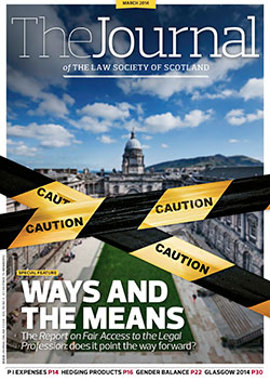Digital deeds move closer
Commencement order update
Recently the second commencement order for the 2012 Act was made by the Scottish Ministers and laid in the Parliament. The Land Registration etc (Scotland) Act 2012 (Commencement No 2 and Transitional Provisions) Order 2014 (SSI 2014/41) was signed by our Minister, Fergus Ewing MSP, at Parliament on Wednesday 19 February and was laid two days later on the 21st.
The Order commences Part 10 of the Act, which includes sections 96, 97 and 98, amending the Requirements of Writing (Scotland) Act 1995 to allow for electronic documents and electronic signatures; section 99, which allows the Keeper to operate a system to enable automated registration in the Land Register; and section 100, allowing the Scottish Ministers to make regulations to enable electronic registration in any of the registers under the management and control of the Keeper.
The Order is laid in the Parliament for 28 days and is subject to negative procedure. During this time the Parliament has the opportunity to scrutinise the Order; if necessary, it can be referred to committee for further scrutiny. Some of the provisions referred to in the Order will come into force on 22 March and some on 11 May, with the remainder coming into force on the designated day, unless the Order is annulled within 40 days of being laid. The provisions coming into force on 22 March will allow regulations to be made that will prescribe the requirements for electronic documents and electronic signatures for some of the documents governed by the 1995 Act. When those regulations come into force, solicitors will be able to conclude missives by electronic means. The regulations will not prescribe the requirements for electronic registration, which will be limited to documents created in the ARTL system.
2012 Act website
The 2012 Act campaign site, which is the main information hub for the Land Registration etc (Scotland) Act 2012, can be found at www.ros.gov.uk/2012Act. The site offers quick and easy access to essential information about the 2012 Act, as well as upcoming awareness events. Key impact information will be added to the site up to the designated day; the most recent update covers FAQs for advance notices. Professionals can sign up for 2012 Act email updates at www.ros.gov.uk/2012act/ezine.html
Engaging with stakeholders
We are committed to ensuring that our customers are given relevant and timely information on the changes that will arise on commencement of the main parts of the Land Registration etc (Scotland) Act 2012. Interest is high from solicitors around the country for RoS workshops which provide more detail about the changes.
We plan to hold a number of RoS-organised events in key geographical areas, as well as with specific groups, to ensure that all relevant stakeholders have the opportunity to attend an event. Discussions are already under way with legal faculty groups at a local level and through contact with the Law Society of Scotland co-ordinator. This will allow us to reach more than 40 local groups of conveyancing solicitors and their staff throughout the country. In addition, presentations will be made at a range of third-party events to get the message to as wide an audience as possible. We are in talks with the Scottish Paralegal Association, the WS Society and the Edinburgh Professional Support Lawyers group to provide opportunities for us to present to their memberships. Further opportunities to engage with stakeholders will be considered as they arise.
All events are publicised on our 2012 Act website at www.ros.gov.uk/2012act and in our monthly eZine, as well as through any partnership organisations, to ensure maximum visibility. If you would like to sign up for email notifications for new events and other 2012 Act alerts, visit the events page on the 2012 Act website.
Speed and standards remain high
The introduction of service standards has brought a real focus on completing casework within a defined timeframe. This has resulted in 73% of all new casework now being completed within 20 days, but has not detracted from the importance of reducing our stock legacy work. Despite intakes running above forecast, service standards, outputs and quality levels have remained consistently high this financial year.
We also continue to work hard to reduce our arrears. At week 46, our stock of casework was 45,943, which is a 34% reduction from the same point last year. Significantly, the transfer of part arrear has now fallen below 13,500 cases, from a high of over 70,000 just a few years ago.
Declining arrears bring internal benefits, including reduced management and control of casework, less correspondence, and faster turnaround times. It also places RoS in an excellent position prior to the introduction of the 2012 Act.
In this issue
- The role of "attachment" in child custody and contact cases
- No protocol – what expenses?
- Ecocide: a worthy "fifth crime against peace"?
- Mandatory mediation: better for children
- Reservoir safety regulation: a changing landscape
- Reading for pleasure
- Opinion: Mark Hordern
- Book reviews
- Profile
- President's column
- Digital deeds move closer
- Fair access - a fair way to go
- No protocol – what expenses? (1)
- Hedges: not all bad news
- Daring to be different
- Financial planning or wealth management – is there a difference?
- Success in the balance
- Wealth management for business leaders and owners
- Purpose of the protocol
- Actionable data wrongs?
- Land Court: business as usual
- Penalty points
- Scottish Solicitors' Discipline Tribunal
- Fever pitch
- Heritage regained
- All grist to the mill
- Wills: is it OK to act?
- Gongs, dinners and just deserts
- Perils of the home
- Ask Ash
- Scots lawyers debate Union in London
- Public Guardian news roundup
- Law reform roundup
- Personal Injury User Group at your service
- Diary of an innocent in-houser






